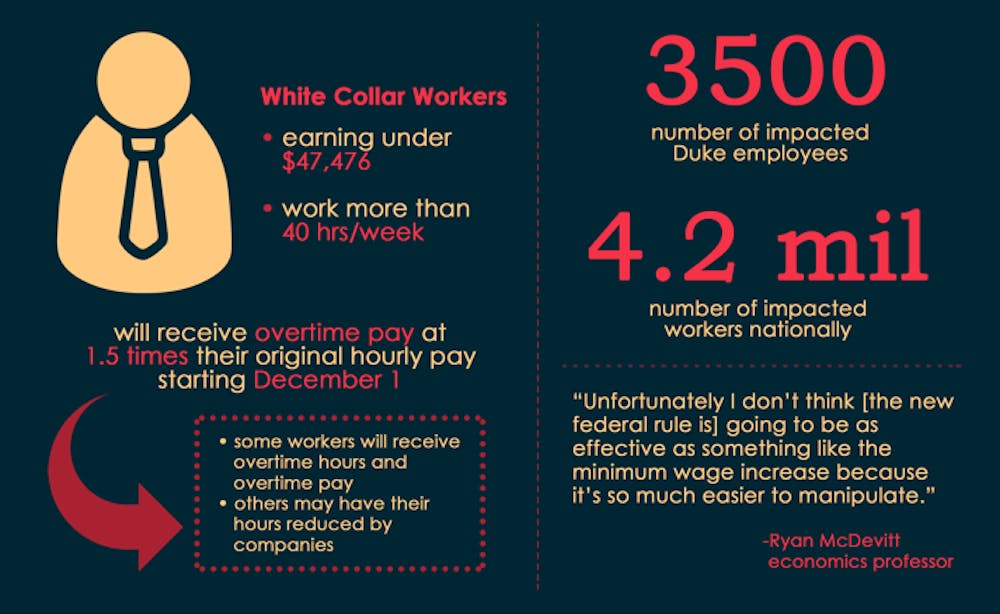A new federal regulation announced Wednesday will make more white-collar employees eligible for time-and-a-half overtime pay, although some have raised concerns that the regulation could be harmful for college graduates.
The change issued by the U.S. Department of Labor requires white-collar employees earning less than $47,476 a year to receive overtime pay at 1.5 times their original hourly pay if they work more than 40 hours per week. The regulation changes the minimum salary threshold—above which workers are ineligible for overtime pay—from $23,660 to $47,476.
3,500 Duke employees and 4.2 million workers nationally are expected to benefit when the rule goes into effect Dec. 1, according to a Duke Today release and a CBS News report.
“Duke has been closely monitoring the national discussions related to the proposed regulation and have been accessing the potential impact since it was recommended last year,” Vice President for Administration Kyle Cavanaugh said in the release. “We are reviewing the details of the new regulation to determine which positions will become newly eligible for overtime, but based on our early projections the change could affect up to 3,500 staff members at Duke, with the largest portion being University staff.”
The DOL considers undergraduate and graduate students engaged in research to be in an educational, not employment, relationship. As such, the department "does not assert such workers are entitled to overtime," according to a DOL guidance sheet for higher education.
The guidance sheet also notes that teachers, including teaching assistants, and coaches are often ineligible for overtime pay and thus not affected by the new regulation.
Ryan McDevitt, an assistant professor at the Fuqua School of Business, said that he thinks the regulation will have negative effects on workers in the long-term.
“I think it has a nice headline-grabbing effect—it’s clear that the middle class has been suffering through the recovery years of the last recession, and it is a very tangible way to show that we’re trying to help this segment of the population,” McDevitt said. “Unfortunately I don’t think it’s going to be as effective as something like the minimum wage increase because it’s so much easier to manipulate.”
Economists predict that while some workers will receive overtime hours and consequently overtime pay, other workers may have their hours reduced by companies, McDevitt said. He noted that he believes this will have the biggest impact on young college graduates.
“Think about someone right out of college who just got their first salaried job," he said. "These are going to be the most impacted workers because they have to put in long hours to prove themselves, they’re going to be passed on some menial work, often they’re not going to be very efficient with what they’re doing so they’re going to have to put in extra hours after work. I think this is a group that’s going to be really hit hard.”
Cavanaugh explained that the University is making an effort to mitigate any potential negative impacts on Duke staff.
"Eligibility for certain benefits at Duke are based on exempt or non-exempt status and years of service," Cavanaugh said in the release. "We are taking steps now to ensure that staff members who have established eligibility for certain benefits such as retirement and paid time off do not have any reduction in benefits as a result of this regulation.”
Vice President Joe Biden said in a Wall Street Journal article that a reduction in hours or a pay increase might both be beneficial to workers, saying that reduced hours will mean more time to spend with their families or go to school.
“Either way, the workers win," Biden said.
McDevitt noted that opinions on the regulation will likely be split along party lines.
“It doesn’t mean that it’s right or wrong,” McDevitt said. “[Republicans] believe in free markets and keeping government out of the labor markets, while Democrats think there’s more room for other protections.”
Get The Chronicle straight to your inbox
Signup for our weekly newsletter. Cancel at any time.

